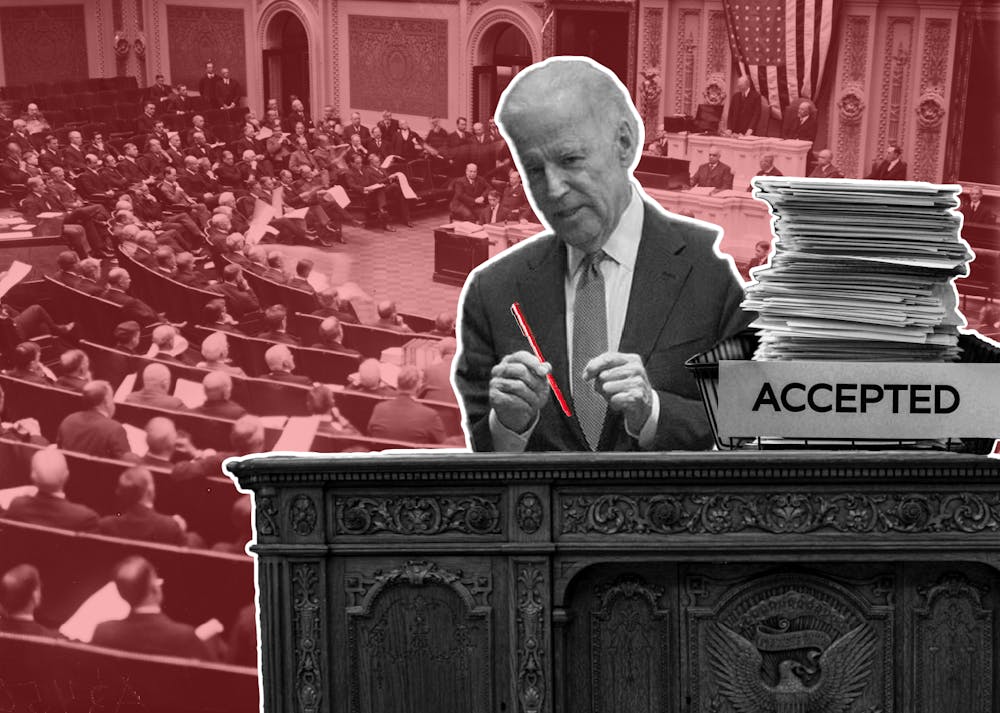President Joe Biden announced last month his promise to provide two years of tuition-free community college for every student would not be fulfilled by the proposed Build Back Better Act. The provision was unlikely to pass the Senate, where Democrats hold a slim majority.
The Build Back Better Act was previously tied to a $1 trillion infrastructure bill the House sent to the president's desk late Friday night. The infrastructure bill was approved by Congress, but the act has been stalled by negotiations.
Cameron Adams, a senior majoring in global studies and president of ASU Young Democrats, said she was disappointed tuition-free community college was cut from the bill.
"That was a big thing that Biden had talked about on the campaign trail and a big thing that Democrats have been talking about for years, so very disappointing," Adams said.
Adams said two years of tuition-free community college would have helped low-income students pursue better educational and employment opportunities.
"Community college is a total game changer for a lot of people," Adams said.
There is evidence to suggest increased access to community college raises net earnings, especially for low-income students. However, some research suggests two-year degrees are not nearly as important as bachelor's degrees for improving earnings.
Moderate Democratic Sens. Joe Manchin from West Virginia and Kyrsten Sinema from Arizona opposed the provision, which would have given more than $45 billion to states to fund the program.
In 2015, then-Rep. Sinema gave a speech at ASU calling on Congress to address student debt. Sinema continues to teach at ASU's Watts College of Public Service and Community Solutions.
READ MORE: Sinema is betting on bipartisanship. Students aren't buying it
Arjun Rondla, a junior majoring in political science and the secretary for ASU College Republicans, said he was happy tuition-free community college was cut from the bill because he fears government involvement in education would only exacerbate existing issues, like high tuition rates.
"I'm very grateful for Sen. Sinema and Sen. Manchin to have the backbone to stand up for what they think is correct," Rondla said. "I'm really grateful that here in Arizona, Sen. Sinema understands what passing this bill in the Senate could mean for students such as us, for younger people and what it could mean for our country."
In May, Gov. Doug Ducey signed a bill allowing community colleges to offer some four-year degrees. Previously, students would have to transfer to another school for a bachelor's degree. ASU has a pathway called MyPath2ASU, which helps students minimize credit loss as they switch universities.
READ MORE: Arizona community colleges may now offer four-year degrees under new law
Daniel Triana, a junior majoring in sports journalism, attended a community college before serving in the Navy and then transferring to ASU. Triana said he couldn't afford a four-year institution after high school.
"I don't think that a community college associate's degree necessarily translates to a workforce paying job. I think you still need a bachelor's degree, at least. But (community college) definitely would help you get to a bachelor's degree," Triana said.
Triana said he supported tuition-free community college.
"It's hard to focus on education and work a complete job and have a social life," Triana said, adding he'd worked 30 hours a week just to complete his two-year program.
Biden said a proposal part of the Build Back Better plan will increase the maximum Pell grant award by around $500 per student, falling short of his campaign promise to double it. The federal Pell grant is awarded to students who "display exceptional financial need," according to the Department of Education.
Melissa Pizzo, ASU's associate vice president of academic enterprise enrollment and financial aid and scholarship services, said the proposed Pell grant expansion would affect a significant number of ASU students since 50% of award recipients receive the maximum amount of support already.
In 2019, about 38,000 ASU students qualified for the federal Pell grant. The average resident Pell grant recipient at ASU had 59% of their financial need met in the same year.
"Anytime a student can get additional gift aid, that's obviously going to help them offset any of our costs of tuition and housing and meals," Pizzo said.
Adams said while any increase in the Pell grant is a good thing, the proposed $500 increase won't do enough to counter rising tuition costs for low-income students at ASU. She said the cost of college is increasing faster than federal aid.
"It's probably not enough," Adams said.
Editor's note: Arjun Rondla is a former State Press columnist.
Reach the reporter at mphughe3@asu.edu and follow @MasonHu29413328 on Twitter.
Like The State Press on Facebook and follow @statepress on Twitter.
Continue supporting student journalism and donate to The State Press today.




